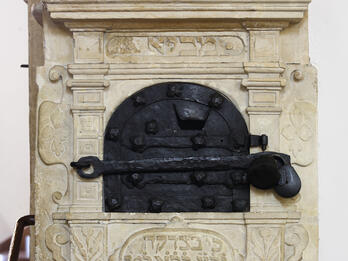Takkanot (Regulations)
Inasmuch as the association of balbirer [artisan barbers] have seen boys break away from their masters and think of themselves as expert physicians, and, on account of which, they have failed in certain procedures, which caused danger to life, by bleeding and by treating bruises and wounds. [ . . . ] They also do harm to real, tax-paying physicians, as they prevent them from earning a proper livelihood, for themselves and their households.
Therefore, the expert artisans have concurred, seven in number and steadfast together, and they are: master Sender balbirer, master Shmeril balbirer and his brother, master Hirsh, master Ḥayim balbirer, master Moses balbirer, and master Yeḥiel balbirer. They have shaken hands and performed a binding act of kinyan [formal acquisition] [ . . . ] and the lords and the good heads of the community have agreed with them.
- First of all, they undertake to create a poll to collect charity from among them, each of them a willing heart, every week.
- Each balbirer is permitted to keep only one boy with him, whom he will teach the profession, and who will bind himself to him to serve for three consecutive years. For two years this boy is not permitted to let anyone’s blood, and even in the third year, he is only permitted to let blood when his master is standing behind him, so that he can learn and become accustomed to perform the task in the best manner. This will ensure that he will not faint and will not be negligent in his work.
- Permission will be granted to each of them to take another boy only on condition that the majority of the members of the aforementioned society agree that he may serve under him. [ . . . ] The boy must bind himself to him for three years, as stated above. Anyone who violates these terms renders himself fully liable to pay a debt to the old thaler tzedakah fund, aside from other severe punishments that may be imposed on him.
- They have also agreed that all boys who have bound themselves to be with a balbirer, either for the three years or in a partnership, as stated above, are obligated to inscribe in advance in the community register that they have committed themselves not to leave this place, so that they do not make life difficult for the members of our community. If any of them does not commit himself as above, it will be entirely forbidden for the balbirer to keep him, even for one day.
- The balbirer have also committed themselves not to raise their rates and thereby become a hardship on the members of our community. Rather, they will take only in accordance with the previous custom, the fee for bloodletting, kepzetsin [haircuts], shaving, and the payment for healing bruises and wounds, so that they will not cause any outcry against them from members of our community. However, at the same time they may not sell themselves short and cut their prices for their work—perish the thought—to waive the sum to which they are entitled and take less than one penny for kepzetsin trikine [a dry haircut] from each client. If anyone violates this condition and relinquishes his fee for the work, [ . . . ] he will be expelled from the aforementioned profession, both he and his apprentice.
- They have also undertaken that if a member of the community, as may happen, summons one of the balbirer but does not find him suitable, and takes another in his place, the second one is not permitted to treat him until the hirer has paid the first balbirer for the work that he has done. In any event, the second balbirer is not entitled to speak ill of his colleague or aggrandize himself through his disgrace. [ . . . ]
- If it should happen that someone calls upon two balbirer at once, and both come at the same time, while the wound is still open, then the pair of them shall divide the fee equally, and any expense will also be borne equally by both of them. However, if one of them was first to bandage the wound, the second is obligated to leave the house of that wounded person immediately, without delay.
- They have also agreed among themselves that if another expert settles in our community [ . . . ] but does not wish to bind himself as well by the strong and powerful bond to all the aforementioned details, then the balbirer will be obligated to support one another and to set out against him in every possible manner, to protest against him and his work, until he accepts upon himself to observe and perform all the aforementioned details.
- The members of our community are also obligated, regarding balbirer who are not currently here, to strengthen their fortress and protest against their doing the aforementioned work until they have given their consent to maintain all of the above. [ . . . ] And the seven aforementioned balbirer have accepted and taken upon themselves that there should be brotherhood and friendship among them, and on the three [pilgrimage] festivals they will embrace one another lovingly and rejoice in all the festivities with goodness of heart. We also agree to comply with all regulations of the Sages, as sealed with an actual handshake on this day, Sunday, 18 Kislev 5400 [1639].
Translated by
.
Credits
The Guild of Barbers of Kraków, “Takkanot (Regulations)” (manuscript, Kraków, 1639). Published in: Krako-Kazimyez-Krakov (Studies in the History of Cracow Jewry), ed. Elchanan Reiner (Tel Aviv: Tel Aviv University Press, 2001), pp. 317–319.
Published in: The Posen Library of Jewish Culture and Civilization, vol. 5.




